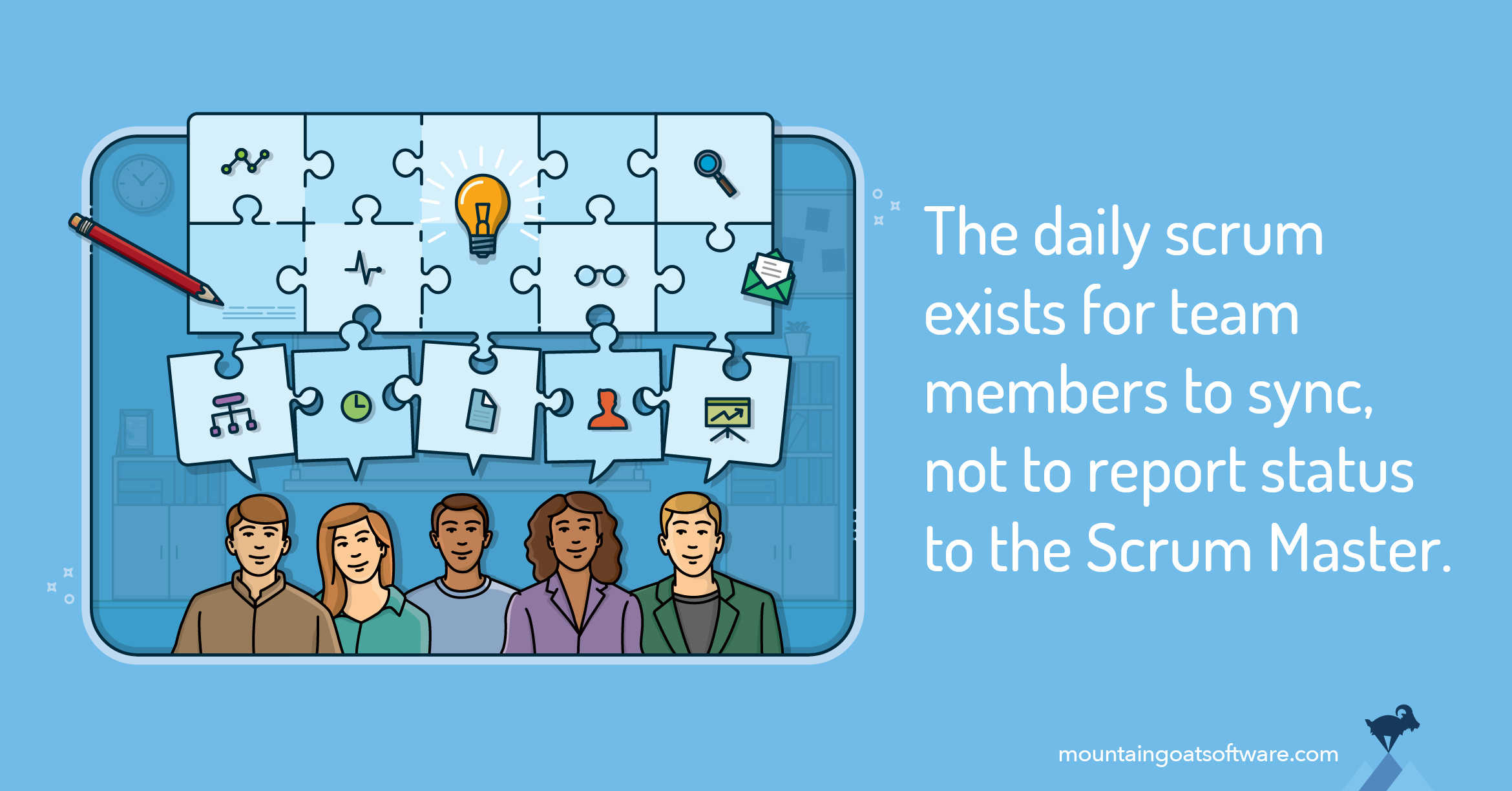The daily scrum: It's not a status meeting, it's a synchronization meeting. The term status meeting conjures images of sitting around a table with each person giving an update to a project manager while everyone else feigns interest (In reality, they're either mentally preparing for their own upcoming update or wondering how much longer the meeting will last.)
In contrast, the daily scrum meeting is designed for team members to synchronize their effort. You don't want two designers working on the same screen without each knowing about it. Similarly, someone better be working on a critical task if the sprint ends tomorrow.
Done well a daily scrum meeting is energizing. People leave the meeting enthused about the progress they're making as a team, or inspired to work together to move something to done. This won't happen every day for every team member, of course, but if team members dread going to the daily scrum, that is usually a sign of trouble.
So if the meeting is for the team members to synchronize their work with one another, what does the Scrum Master do? Find out in the video, or read the full transcript below.
Should the Scrum Master Attend Daily Scrums?
I do think the Scrum Master should attend daily scrums. I know the Scrum Guide says they should only attend if working on sprint backlog items, but all the best teams I've worked with have had Scrum Masters who attended their daily scrums.
The Daily Scrum Is for the Whole Team, Not Just for Scrum Masters
The daily scrum is not a status meeting. If it were a status meeting, we'd see the Scrum Master call on each person, probably ask about their progress, plans, and problems, and take notes so they could follow up the next day to be sure everything got done.
Wait, we do see that happen—a lot.
Those Scrum Masters need to let go and let developers decide how to conduct their own daily scrums. Letting the developers decide how to best to sync during a daily scrum is one of the ways to overcome common objections to the daily scrum.
If you're a ScrumMaster, don't make eye contact with someone giving an update. Making eye contact is human nature. When we speak, we make eye contact with someone. Many teams, especially those new to Scrum, will naturally look at the ScrumMaster rather than one another.
By not making eye contact with someone giving an update, the ScrumMaster can, in a subtle way, prevent the meeting from becoming a one-way status report to the ScrumMaster.
New Teams Need Coaching from Scrum Masters
The daily scrum is a time for the team to sync. Sure, if the team is new to Scrum, a good Scrum Master will coach team members on how to run an effective daily scrum. The Scrum Master will remind teams of the purpose of daily scrums and coach their teams to
- Avoid problem solving
- Keep updates brief
- Focus on what was accomplished rather than on everything they spent time on, and so on.
As the team members learn how to conduct their own meeting, though, the Scrum Master can and should fade out of leading the meeting.
Scrum Masters Should Participate in the Daily Scrum
Why then do I want the Scrum Master to participate? Because it's the best place to hear about impediments.
In daily scrums, developers are expected to communicate anything slowing them down. Scrum Masters will be expected to help resolve those impediments. So Scrum Masters should be there to hear about them.
Also, participating in daily scrums shows a Scrum Master's support for the team. I prefer that over a Scrum Master with the attitude of being too busy to participate in something the rest of the team is expected to do.
A good Scrum Master will remember though, that the daily scrum exists for team members to share their progress and synchronize effort.
Last update: November 5th, 2025








